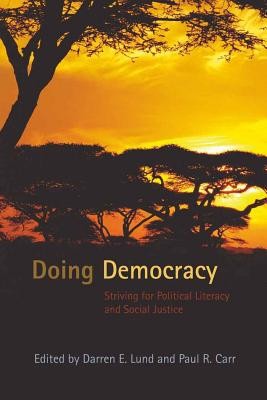
- We will send in 10–14 business days.
- Publisher: Peter Lang Inc., International Academic Publishers
- ISBN-10: 0820497452
- ISBN-13: 9780820497457
- Format: 17.8 x 25.4 x 2.2 cm, softcover
- Language: English
- SAVE -10% with code: EXTRA
Doing Democracy; Striving for Political Literacy and Social Justice (e-book) (used book) | bookbook.eu
Reviews
Description
In this provocative collection of essays with a distinctly critical and nuanced approach to how democracy is taught, learned, understood, and lived, authors from four continents share their visions on how democracy needs to be cultivated, critiqued, demonstrated, and manifested throughout the educational experience. The collective concern is how we actually do democracy in education. The essays argue that democracy must be infused in everything that happens at school: curriculum, extra-curricular activities, interaction with parents and communities, and through formal organization and structures.
One of the book's central questions is: Are educators merely teaching students skills and knowledge to prepare them for the world of work, or is education more about encouraging students to thrive within a pluralistic society? This book reveals that democracy is an ethos, an ideology, a set of values, a philosophy, and a complex and dynamic terrain that is a contested forum for debate.
From seasoned veterans to emerging scholars, these writers challenge the idea that there is only one type of democracy, or that democracy is defined by elections. Using a range of theoretical, conceptual, and methodological approaches, each essay makes a compelling case for how education can advance a more critical engagement in democracy that promotes social justice and political literacy for all. Diverse examples illustrate the theme of doing democracy. With its numerous models for teaching and learning to encourage critical thinking and engagement, this book is certain to be an invaluable resource to educators, researchers, students, and anyone with a passion for democratic ideals.
EXTRA 10 % discount with code: EXTRA
The promotion ends in 19d.02:23:54
The discount code is valid when purchasing from 10 €. Discounts do not stack.
- Publisher: Peter Lang Inc., International Academic Publishers
- ISBN-10: 0820497452
- ISBN-13: 9780820497457
- Format: 17.8 x 25.4 x 2.2 cm, softcover
- Language: English English
In this provocative collection of essays with a distinctly critical and nuanced approach to how democracy is taught, learned, understood, and lived, authors from four continents share their visions on how democracy needs to be cultivated, critiqued, demonstrated, and manifested throughout the educational experience. The collective concern is how we actually do democracy in education. The essays argue that democracy must be infused in everything that happens at school: curriculum, extra-curricular activities, interaction with parents and communities, and through formal organization and structures.
One of the book's central questions is: Are educators merely teaching students skills and knowledge to prepare them for the world of work, or is education more about encouraging students to thrive within a pluralistic society? This book reveals that democracy is an ethos, an ideology, a set of values, a philosophy, and a complex and dynamic terrain that is a contested forum for debate.
From seasoned veterans to emerging scholars, these writers challenge the idea that there is only one type of democracy, or that democracy is defined by elections. Using a range of theoretical, conceptual, and methodological approaches, each essay makes a compelling case for how education can advance a more critical engagement in democracy that promotes social justice and political literacy for all. Diverse examples illustrate the theme of doing democracy. With its numerous models for teaching and learning to encourage critical thinking and engagement, this book is certain to be an invaluable resource to educators, researchers, students, and anyone with a passion for democratic ideals.


Reviews